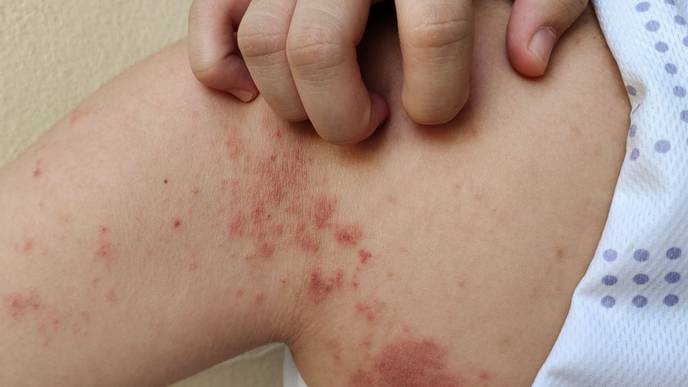Hope for Autoimmune Skin Disorder Sufferers with New Immunotherapy Strategy

12/05/2023
Breakthrough research has revealed new ways to remove immune cells that cause skin autoimmune diseases without affecting protective cells that fight infection and cancer.
Researchers, led by University of Melbourne’s Professor Laura Mackay, a Laboratory Head and Immunology Theme Leader at the Peter Doherty Institute of Infection and Immunity (Doherty Institute), discovered distinct mechanisms controlling different types of immune cells, and found that, by precisely targeting these mechanisms, they could selectively eliminate ‘problematic cells’ and reshape the skin's immune landscape.
Our skin is packed with specialised immune cells that protect against infections and cancer and promote healing. These cells, called tissue-resident T cells or TRM cells, stay in place to fight infections and cancerous cells in the skin. However, when not controlled properly, some of these skin TRM cells can contribute to autoimmune diseases, such as psoriasis and vitiligo.
University of Melbourne’s Dr Simone Park, an Honorary Research Fellow and former Postdoctoral Fellow in the Mackay Lab at the Doherty Institute, and lead first author of the study, said that this research is the first to describe the unique elements that control various types of skin TRM cells in animal models, offering precise targets for potential treatment strategies.
“Specialised immune cells in our skin are diverse: many are critical to prevent infection and cancer, but others play a big role in mediating autoimmunity,” said Dr Park.
“We discovered key differences in how distinct types of skin T cells are regulated, allowing us to precisely edit the skin’s immune landscape in a targeted way.”
University of Melbourne’s Dr Susan Christo, Senior Research Officer in the Mackay Lab at the Doherty Institute and co-first author of the study, explained how these discoveries could advance efforts to treat skin disease.
“Most autoimmune therapies treat the symptoms of the disease rather than addressing the cause. Conventional treatments for skin disorders often impact all immune cells indiscriminately, meaning that we could also be wiping out our protective T cells,” said Dr Christo.
“Until now, we didn’t know how to pick apart ‘bad’ T cells in the skin from the ‘good’ protective ones. Through this research, we discovered new molecules that allow us to selectively remove disease-causing T cells in the skin.”
In this groundbreaking study published in Science, the research team harnessed this new knowledge to eliminate 'problematic' cells that can drive autoimmune disorders, while preserving the ‘good’ ones that are essential to maintain protective immunity.
University of Melbourne’s Professor Laura Mackay, senior author of the study, explained that these findings could pave the way for more precise and long-lasting therapies for skin disease.
“Skin conditions like psoriasis and vitiligo are difficult to treat long-term. The T cells driving disease are hard to remove, so patients often need life-long treatment. Our approach has the potential to revolutionise the way we treat these skin disorders, significantly improving outcomes for people dealing with challenging skin conditions,” said Professor Mackay.
With the study demonstrating successful removal of specific skin T cells in animal models, further research is necessary to validate the efficacy of these strategies in human subjects. Dr Park hopes the study will inspire the development of new treatments for skin disease.
“These discoveries bring us one step closer to developing new drugs that durably prevent autoimmune skin disorders without compromising immune protection,” said Dr Park.
Peer review: Park S, Christo S, et al. Divergent molecular networks program functionally distinct CD8+ skin resident memory T cells. Science (2023). DOI: 10.1126/science.adi8885
Collaboration: The researchers acknowledge that this work is the result of a collaboration between the Doherty Institute, the National Institutes of Health (NIH) in the USA, WEHI, the Fiona Elsey Cancer Research Institute at Federation University and the Olivia Newton John Cancer Research Institute all located in Australia.
Funding: This research was supported by the National Health and Medical Research Council (NHMRC), Australia; Cancer Council Victoria, Australia; Cancer Research Institute, USA; Allen Foundation, USA; Fiona Elsey Cancer Research Institute, Australia; National Institute of Allergy and Infectious Diseases (NIAID), USA; Howard Hughes Medical Institute, USA; and Bill & Melinda Gates Foundation, USA.

Facebook Comments